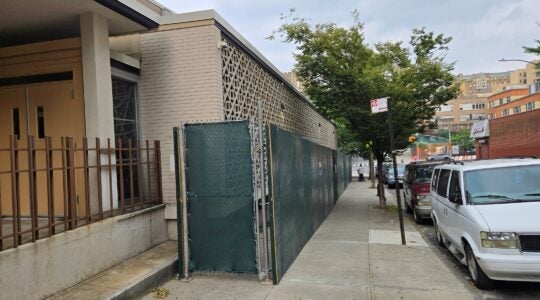University of Maryland students are used to getting alerts from campus police. So, when I received an email on a recent Saturday night, I assumed it would be as mundane as every other campus alert that came before it. But when I opened it, I was in shock.
It said that on Dec.10, 2019, a University of Maryland student received anti-Semitic text messages on her phone, according to the University of Maryland Police Department. Then, on Feb. 24, Muqarrab Ahmed Abdullah, a 24-year-old UMD student, was charged with three separate hate crimes, including “electronic communication harassment against the victim because of the victim’s religious beliefs.”
While this was a frightening notification to get, I took comfort in knowing my campus stood up for its students, and not only condemned the hateful rhetoric but took action.
In the wake of the UMD student being charged, Georgina Dodge, the vice president for diversity and inclusion, and Patricia A. Perillo, the vice president for student affairs, released a statement supporting Jewish students on campus.
“To our Jewish friends, co-workers, fellow students, colleagues, and alumni we stand with you,” she said. “We will work closely with Hillel, university chaplains, and student groups to provide space and resources.”
Denouncing anti-Semitism may seem like an obvious stance for a higher institution to make, but unfortunately, it is not the case on all college campuses today. Think about what happened at UC Berkeley just last month; a student group put up a display glorifying a terrorist, but the student government refused to condemn it. Other examples are too easy to find: The University of Minnesota hosted the National SJP Conference (Students for Justice in Palestine) last November, anti-Israel students stormed York University in Toronto last year when multiple Israeli soldiers came to speak and Columbia allowed the anti-Semitic prime minister of Malaysia to speak on campus in September. The school’s president, Lee Bollinger, even wrote a letter to Students Supporting Israel at Columbia, defending his invitation, according a New York Post article.
“This is something that is happening on many campuses,” said Scott Sandor, another freshman at Maryland, about anti-Semitism occurring on the UMD campus. “But I’m so grateful that our campus is actually stepping up for what’s right.”
This is not the first time UMD responded to anti-Semitism. Last year, when the student government proposed a bill that supported BDS (the boycott, divestment and sanctions movement against Israel), Jewish students flocked to speak out against it. It was overwhelmingly rejected.
The University of Maryland is known for its large Jewish presence. According to Hillel, there are about 6,000 Jewish students on campus (20 percent of the student population). The Orthodox, Conservative and Reform communities each have strong student leadership that works in tandem with Hillel staff to enrich the lives of all Jews on campus. Over 300 students attend Hillel’s Friday night services every week. Chabad and Meor Maryland are also strong centers of Jewish life on campus.
The Jewish organizations at UMD also have strong ties to local law enforcement. Every year on Simchat Torah, University Police escort hundreds of Jewish students through campus as they parade with a Torah scroll. Police are also often found around Hillel, ensuring the safety of all students.
“We applaud the rigorous investigation of [the recent] matter by the University of Maryland Police Department, and we thank the University of Maryland for its tireless efforts in creating a diverse and tolerant campus,” Rabbi Ari Israel, the executive director of Maryland Hillel, said in a statement referring to the charge against Abdullah.
In my short time here, I have been surprised at how tolerant and accepting the community is.
I’m a member of CIVICUS, a community service learning, political engagement and leadership development program on campus. I’m also a journalism major. I have found that I don’t often take classes with many other Jewish students, and before arriving to campus I feared that learning environments that dealt with the media and social justice (as opposed to, say, a science-based field) might elicit situations where anti-Semitism would arise.
My thinking was based on the fact that anti-Israel groups like SJP tend to hijack social justice groups and compare the plight of the Palestinians to other minorities facing oppression. The media can also rear its ugly anti-Semitic head sometimes — just scroll through Honest Reporting’s Twitter feed to see what I mean.
However, I was pleasantly surprised. Multiple peers have gone out of their way to acknowledge my University of Maryland kipa. I’ve had long conversations with other students and professors about my time in Israel, sharing stories and experiences from my gap year and countless visits to the country.
Granted, I’ve been here for less than a year. And hearing the news from other universities can be unsettling at times. But the recent actions by UMD made me more comfortable knowing that someone has my back if I ever need it.
I call on more campuses to support their Jewish students, and for Jewish students to support themselves. The more Jews that are confident in who they are, and the more universities allow them to express that, the greater the campus environment can be for all students.
What happened here last semester is not who we are. This isn’t a common occurrence here. But we’re used to and thankful for the support that the University gives us every day, and we hope to be an example for campuses worldwide. Hopefully, the next UMD alert will be just as mundane as they usually are.
Ben Baruch is a freshman at the University of Maryland, College Park. He is a 2018 Write On For Israel graduate.
This piece is part of “The View From Campus” column written by students on campus. If you would like to contribute to it, email lily@jewishweek.org for more info.
The New York Jewish Week brings you the stories behind the headlines, keeping you connected to Jewish life in New York. Help sustain the reporting you trust by donating today.




